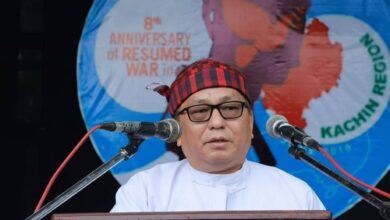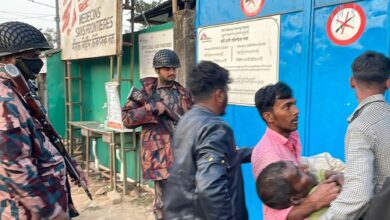
In a meeting of Myanmar’s National Defence and Security Council (NDSC) in Naypyitaw on Tuesday its members decided to extend the country’s state of emergency and the term of the junta led by Min Aung Hlaing for another six months, according to an announcement broadcast by state-run media on Wednesday evening.
The junta chief submitted a report to council members reflecting on two years of military rule as is required by the army-drafted 2008 Constitution, which he used to rationalise his claim to power when he staged a coup on February 1, 2021.
Section 425 of the charter states that “if the Commander-in-Chief of the Defence Services submits the extension of the prescribed duration by giving reasons why he has not been able to accomplish the assigned duties,” the NDSC can “normally permit two extensions of the prescribed duration for a term of six months for each extension.”
The military declared a state of emergency for a year when it took power and has since extended it twice for six months each time. The most recent one expired on Wednesday.
In the official announcement, Min Aung Hlaing repeated his justification for the coup, citing unfounded allegations of voter fraud in the 2020 general elections in which the ruling National League for Democracy (NLD) won a landslide victory.
He claimed that the nation continues to be confronted with acts of “terror” perpetrated by the People’s Defence Force, which has formed chapters throughout the country to resist the coup regime, and has allied with ethnic armed organisations.
Members of the NDSC then decided that the rule of Min Aung Hlaing’s self-described State Administration Council be extended for another half a year, concluding that the country remained in “extraordinary” circumstances and “has not returned to normalcy yet.” They cited the same section of the Constitution—425—for the extension.
The junta chief said that the country was still not ready to hold a general election with an “accurate” voter list and “free” polls, since nearly half of the more than 300 townships in Myanmar lack security and stability.
“We need to hold a general election in all states and regions simultaneously and we can’t do it in one place after another,” Min Aung Hlaing said. “It is not enough to [hold it] only in urban areas,” he added.
He also emphasised that Myanmar’s electoral system needed to be changed to one of Proportional Representation, which would make it easier for less popular junta-aligned parties to win seats. Myanmar’s elections currently operate under a First Past the Post system, meaning that the candidate who wins the most votes in each constituency becomes an MP, while all the votes that went to the losing candidates are effectively thrown out.
He added that the country’s political parties will also need to be changed in line with the electoral system switch, hinting that the parties might need to merge in order to better represent the people.
Days before the NDSC meeting, the regime amended the Political Parties Registration Law, aiming to outlaw the NLD. In Wednesday’s state-run newspapers, the junta’s electoral commission also released by-laws of the Political Parties Registration Law and called on interested parties to start proceeding with their registration.
Also addressed by the military chief at the meeting was the need for the collection of the country’s updated population data. He noted that Myanmar’s last census was carried out in 2014 and that it should be conducted every 10 years. Min Aung Hlaing stressed that an updated census would be critical to obtaining an accurate voter list ahead of an election. However, the military chief did not provide a timeline for the polls.
“Our government will try our best to be able to hold an election in a number of constituencies not less than in the previous 2020 election, and also under peaceful conditions—not [those that are] worse [than in 2020],” Min Aung Hlaing said, referring to his junta.
The 11-member NDSC body is prescribed by the military-drafted Constitution to include the president, two vice-presidents, two house speakers, commander-in-chief and his deputy, and the ministers of foreign affairs, defence, home affairs, and border affairs.
Not all members were present at Tuesday’s meeting. In attendance was the regime’s acting president Myint Swe, Lower House speaker T Khun Myat, deputy commander-in-chief Soe Win, defence minister Gen Mya Tun Oo, home affairs minister Lt-Gen Soe Htut, foreign affairs minister Wunna Maung Lwin, and border affairs minister Lt-Gen Tun Tun Naung.
Also participating were regime officials who were selectively invited, such as military council secretary Lt-Gen Aung Lin Dwe along with his joint secretary Lt-Gen Ye Win Oo, and attorney-general Thida Oo.
T Khun Myat suggested that the council body seek recommendations from the constitutional tribunal regarding whether the new extension was in line with the 2008 charter. According to the broadcast, the tribunal had considered the move and told the regime’s vice-president that the extension was in line with the constitution. Myint Swe, who leads the NDSC, then announced the extension of the country’s state of emergency for a further six months.
Although the NDSC council holds some executive powers of the state, its structure gave military-controlled members majority representation even when Myanmar was under a civilian government.
In response to the regime’s extension of military rule, Aung Kyi Nyunt, who is a central executive member of the ousted NLD party, said that the move was “lawless.”
“The state of emergency will only be over when they are no longer [in power],” he told Myanmar Now over the phone on Wednesday, referring to the military. “They perpetrated this emergency state of affairs. Even if they extend [the junta’s rule], it is lawless.”
According to the 2008 Constitution, only the president can hand over the state’s sovereign power to the commander-in-chief under “a state of emergency.”
Though the military arrested and charged the NLD’s President Win Myint when it staged the coup two years ago, it did not depose vice presidents Henry Van Thio and Myint Swe; the latter is currently serving as the regime’s acting president. However, Van Thio has not been in the public eye since the army’s seizure of power.
While both remain NDSC members, Van Thio did not attend the Tuesday meeting for health reasons, according to the regime. Myanmar Now’s sources in Naypyitaw said he was hospitalised on Tuesday with head and neck injuries.
Tuesday marked his third absence from such meetings since the coup. He did not attend previous NDSC gatherings on January 31 and July 31 last year, when the council extended the junta’s rule. On both occasions, Van Thio’s health was cited as the reason for his nonattendance.
On the second anniversary of the country’s military coup, residents in cities and towns in Myanmar protested junta rule with a “silent strike” by avoiding public activities. Myanmar nationals in neighbouring countries such as Thailand held rallies and called for an end of the military’s power grab, which they condemned as “illegal.”
One night earlier, the US, Australia, and allied Western governments announced an expansion of sanctions against the junta, the regime’s energy officials and its network of suppliers and cronies.



